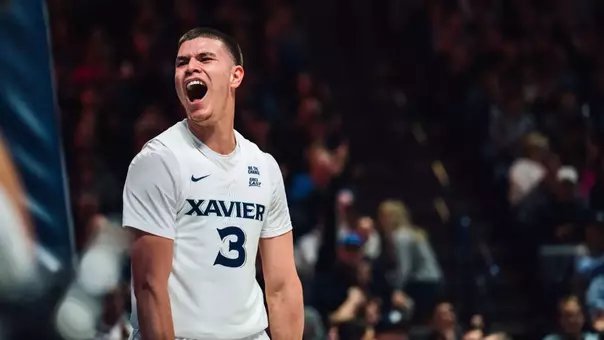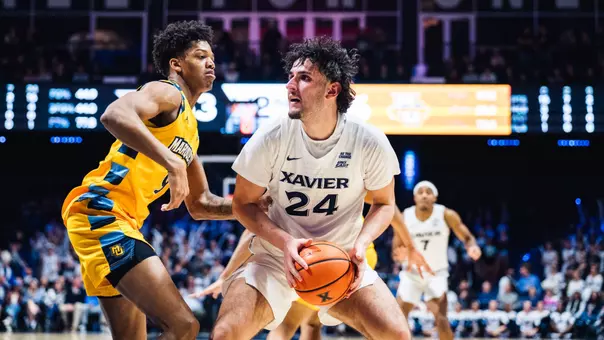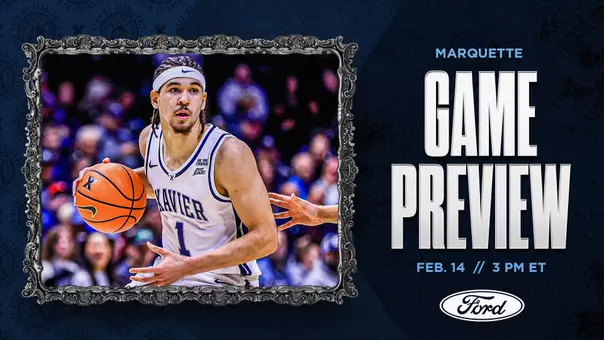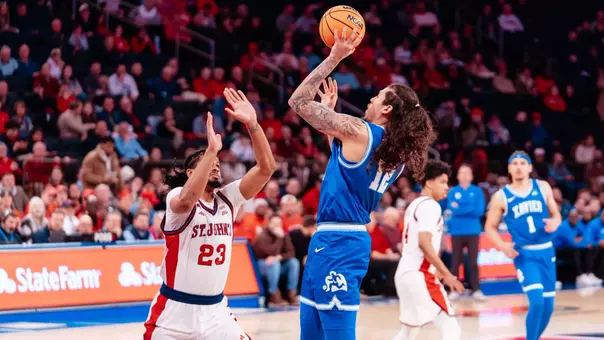Xavier University Athletics
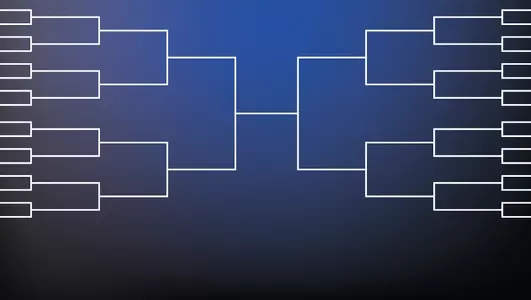
Xavier Nation Magazine Feature: A Sweet Science
03.07.16 | Men's Basketball, Athletic Department
Over two decades, Bracketology has moved from a number-cruncher's pastime to a mainstay of NCAA Tournament coverage
Xavier Nation Magazine talked to three practitioners about their passion for the game.
IN THE BEGINNING
back when Billy Packer was still in everyone's homes and the Internet wasn't,
when Kentucky meant Rick Pitino and John Calipari mentored mid-major Massachusetts, when Selection Sunday represented the solution to a glorious March riddle shrouded in secrecy—there was Joe Lunardi.
Actually, there was Joe Lunardi and a cadre of buddies, huddled in Lunardi's office overnight, hopped up on equal parts caffeine and college basketball, watching the Big West final and fine-tuning predictions of the next day's NCAA Tournament bracket.
Lunardi had begun noodling around with bracket predictions a couple of years earlier, in 1993, but this March, his projection was motivated by self-interest. Lunardi was managing editor of the Blue Ribbon College Basketball Yearbook, and his team was charged with cranking out a new, 80-page postseason preview on the night of Selection Sunday. The more accurately he could predict the NCAA field ahead of time, the less work would be wasted previewing NIT-bound teams.
"Never, ever, did we think we would be doing what we now call bracketology," says Lunardi, now a March mainstay on ESPN.
Since that day, brackets have grown, from 64 teams to 65 to 68. Bracketology has grown much more. It's no longer only a March phenomenon; Lunardi completed his first preseason take back in August.
And it's no longer only Lunardi. Last season, the website bracketmatrix.com collated the bracket forecasts of some 137 bracketologists—including the three profiled here.
EAST REGION
Joe Lunardi - Assistant vice president of communications, Saint Joseph's University (Philadelphia, Pa.)
PLAY-IN GAME: Long before the Internet provided instant access to the stats of Santa Clara's sixth man or the results of Fairleigh Dickinson's last 10 games, Blue Ribbon's postseason guide was the lifejacket that kept you from blindly jumping into the office pool. "In those days, if you had a Louisville–Boise State 3–14 [seeds] game, the only thing anyone knew about Boise State was a thumbnail paragraph in USA Today," Lunardi says. "We had every stat, score, trend, and nugget on each of the then-64 teams." By the second year of the postseason guide, Lunardi was doing his early bracket forecasts in February and providing them to ESPN Sports Zone, the forerunner of ESPN.com; in exchange, they published the 800 number to order the Blue Ribbon book. "As the years went on, the bracket guesses became more popular than the book itself," Lunardi says. He sold his interest in Blue Ribbon to partner Chris Dortch and expanded his involvement with ESPN, which now includes on-camera bracket analysis.
LAST ROUND: In 2015, Lunardi correctly picked 66 of 68 teams in the field, had 42 teams seeded exactly, and 61 teams seeded within one line of their actual seed. His bracket scored fourth-highest by bracketmatrix.com (which weighs brackets more on how accurate the seedings are, on the theory that most bracketologists get the vast majority of the field right). Lunardi figures he's gotten about 97 percent of the teams right since he started.
ONE SHINING MOMENT: Two years ago, Lunardi says, he got all 68 teams right, and 61 within one seed line, his benchmark. "People who say they don't [remember their best bracket] are lying," he says. "It's like your best round of golf. You remember the time of day and every club you hit on every shot."
SEEDS OF WISDOM: Lunardi, a 1982 St. Joe's graduate, teaches an online class in bracketology; it's not for academic credit. "It's a class the way stamp-collecting or knitting is," he says, "but I've had some unbelievably smart people come through it." The final exam, not surprisingly, is a mock bracket.
MINOR UPSET: Lunardi says there are two primary misconceptions about bracketology. One is bias: "Analyst A hates team B for reason C," he says. "At the end of the day, I get paid to be right. I used to say I'd put my own mother in the NIT if she played a weak schedule." The other is that TV manipulates the bracket for matchups: "With 67 games, you're going to have storylines without inventing them," he says. "TV never invented Duke vs. Kentucky. It happened because they were both really good."
FINALLY: "I'm not saying to this day I'm the best at this; I'm just the first at it, with the loudest perch," Lunardi says. "There are people better at the analysis and the numbers-crunching than I'll ever be. But I think I can communicate it in a somewhat lighthearted way to the public. And at the end of the day, we're not saving lives here. This is supposed to be fun."
MIDWEST REGION
Jerry Palm - College basketball and football writer, CBSSports.com (Schererville, Ind.)
PLAY-IN GAME: Palm cracked college basketball's riddle of the Sphinx: the RPI, a prime tool used by the NCAA selection committee to choose and seed teams. For years, its precise components and impact were somewhat of a mystery. Palm, who has a degree in computer science from Purdue, created a database and programs in 1994 to replicate the NCAA's RPI (Ratings Percentage Index), which assigned each team a number value based on winning percentage, opponents' winning percentage, and the winning percentage of opponents' opponents. "I think it was The Sporting News that published a story about a change in the formula," Palm says. "I had a computer and too much time on my hands. I'm working as a programmer and analyst, and I had this new toy called the Internet. I just gathered it for my own edification. I never thought anybody else would be interested." But they were, and soon Palm was providing updates on his own site, collegerpi.com. A year later, he added bracket projections. "I think Joe Lunardi maybe did his the year before, and for the longest time, it was just us," Palm says. In 1999, he started collegebcs.com, replicating that formula to project which teams would play for college football's national championship; in 2002, he quit programming to devote more time to the sites; and in 2012, he shuttered both sites and jumped full-time to CBS.
LAST ROUND: In 2015, Palm correctly picked 67 of the 68 teams in the field, according to bracketmatrix.com. He had 33 teams seeded correctly and 61 within one seed line.
ONE SHINING MOMENT: In 2011, the first year of the "First Four" games in Dayton, Virginia Commonwealth was included as a No. 11 seed, surprising many—but not Palm. He had the Rams in, and they went all the way to the Final Four. "That's probably my favorite hit," he says. "[Coach] Shaka Smart talked about me a lot that March. If there were 351 Division I schools, 350 of them think you hate their team, but VCU is the exception."
SEEDS OF WISDOM: "In a typical year, I'm gonna miss one, but I don't remember the last time I missed two," Palm says. "I've had a couple years when I've had all the at-large teams. But the year George Mason went to the Final Four [2006], I had them in the last four out. If I could have one back, that would be the one."
MINOR UPSET: UCLA's inclusion in the 2015 bracket still stuns, and even rankles, Palm. The 20–13 Bruins beat only one team in the RPI's top 25 and lost four straight road games in one stretch, by 39 vs. Kentucky and by 32 vs. Utah. "That's the worst team ever in the 21 years I've been doing this in terms of how they performed away from home," he says. "Once they went to 68, it became even harder to predict the bottom of the bracket; all the teams can look equally unworthy. Even with all that I would never have guessed UCLA. But this can be as much art as science when you're trying to read the minds of a 10-person committee. There's a lot of distrust of the committee, how they've got it in for the little guy, but I believe they're doing an honest job. Even when I don't agree, I don't think it's political. Whether it's UCLA or George Mason or whoever, they just saw something I didn't see."
FINALLY: Predictably, March is Palm's busiest time. "The last two weeks of the season, I'll basically take a nap at night. The last week of the season, someone has to remind me to eat. After Selection Sunday, I'm going somewhere the first weekend of the tournament, and then to the Final Four. And after the Final Four, I do my taxes and go to bed."
WEST REGION
Stewart Mandel - College basketball and football writer, FOX Sports (Mountain View, Calif.)
PLAY-IN GAME: Mandel, a Cincinnati native and Sycamore High graduate, spent more than a decade at Sports Illustrated before joining FOX in 2014. He projected brackets for nine years at SI, and after a year at FOX he was approached about jumping back into the pool. At SI, he had gravitated more toward college football coverage. "It blew me away how big this has become," he says.
LAST ROUND: In 2015, Mandel picked 66 of 68 teams correctly, according to bracketmatrix.com. He had 37 seeded exactly right and 65 within one seed line.
ONE SHINING MOMENT: "I would never brag about getting 66 of 68; I missed on two," Mandel says. "You should be able to get that. You can create a spreadsheet and import the numbers and get reasonably close." But after focusing primarily on college football for years, he was pleased his bracket wasn't a brick. "With social media now, there's so much more scrutiny," he says. "I was really nervous on Selection Sunday. I didn't want to look stupid."
SEEDS OF WISDOM: "The main difference now is everything is a lot more transparent," Mandel says. "It used to be that the committee more or less operated under a shroud of secrecy. That's not the case anymore." When Mandel worked for SI, NCAA vice president of championships Greg Shaheen visited to demonstrate and explain the tools and software used in the selection process, and the NCAA has begun conducting mock-bracket workshops in Indianapolis for the media to better educate them about the process, something Mandel intends to take part in this season.
MINOR UPSET: Mandel also rejects the notion that any bracketologist brings his own biases with him. "I graduated from Northwestern, which has never made the NCAA Tournament," he says. "I'm not going to put them or anyone in at the expense of my bracket. At the end of the day, I'd rather be right."
FINALLY: The old stand-by about the importance of a strong finish is gone, Mandel says. "The committee will tell you that games played on November 15 count as much as games played on March 15, and I agree with that." And don't buy in totally to the relative importance of good wins and bad losses. "Ultimately, the good wins help more than bad losses hurt," he says.
IN THE BEGINNING
back when Billy Packer was still in everyone's homes and the Internet wasn't,
when Kentucky meant Rick Pitino and John Calipari mentored mid-major Massachusetts, when Selection Sunday represented the solution to a glorious March riddle shrouded in secrecy—there was Joe Lunardi.
Actually, there was Joe Lunardi and a cadre of buddies, huddled in Lunardi's office overnight, hopped up on equal parts caffeine and college basketball, watching the Big West final and fine-tuning predictions of the next day's NCAA Tournament bracket.
Lunardi had begun noodling around with bracket predictions a couple of years earlier, in 1993, but this March, his projection was motivated by self-interest. Lunardi was managing editor of the Blue Ribbon College Basketball Yearbook, and his team was charged with cranking out a new, 80-page postseason preview on the night of Selection Sunday. The more accurately he could predict the NCAA field ahead of time, the less work would be wasted previewing NIT-bound teams.
"Never, ever, did we think we would be doing what we now call bracketology," says Lunardi, now a March mainstay on ESPN.
Since that day, brackets have grown, from 64 teams to 65 to 68. Bracketology has grown much more. It's no longer only a March phenomenon; Lunardi completed his first preseason take back in August.
And it's no longer only Lunardi. Last season, the website bracketmatrix.com collated the bracket forecasts of some 137 bracketologists—including the three profiled here.
EAST REGION
Joe Lunardi - Assistant vice president of communications, Saint Joseph's University (Philadelphia, Pa.)
PLAY-IN GAME: Long before the Internet provided instant access to the stats of Santa Clara's sixth man or the results of Fairleigh Dickinson's last 10 games, Blue Ribbon's postseason guide was the lifejacket that kept you from blindly jumping into the office pool. "In those days, if you had a Louisville–Boise State 3–14 [seeds] game, the only thing anyone knew about Boise State was a thumbnail paragraph in USA Today," Lunardi says. "We had every stat, score, trend, and nugget on each of the then-64 teams." By the second year of the postseason guide, Lunardi was doing his early bracket forecasts in February and providing them to ESPN Sports Zone, the forerunner of ESPN.com; in exchange, they published the 800 number to order the Blue Ribbon book. "As the years went on, the bracket guesses became more popular than the book itself," Lunardi says. He sold his interest in Blue Ribbon to partner Chris Dortch and expanded his involvement with ESPN, which now includes on-camera bracket analysis.
LAST ROUND: In 2015, Lunardi correctly picked 66 of 68 teams in the field, had 42 teams seeded exactly, and 61 teams seeded within one line of their actual seed. His bracket scored fourth-highest by bracketmatrix.com (which weighs brackets more on how accurate the seedings are, on the theory that most bracketologists get the vast majority of the field right). Lunardi figures he's gotten about 97 percent of the teams right since he started.
ONE SHINING MOMENT: Two years ago, Lunardi says, he got all 68 teams right, and 61 within one seed line, his benchmark. "People who say they don't [remember their best bracket] are lying," he says. "It's like your best round of golf. You remember the time of day and every club you hit on every shot."
SEEDS OF WISDOM: Lunardi, a 1982 St. Joe's graduate, teaches an online class in bracketology; it's not for academic credit. "It's a class the way stamp-collecting or knitting is," he says, "but I've had some unbelievably smart people come through it." The final exam, not surprisingly, is a mock bracket.
MINOR UPSET: Lunardi says there are two primary misconceptions about bracketology. One is bias: "Analyst A hates team B for reason C," he says. "At the end of the day, I get paid to be right. I used to say I'd put my own mother in the NIT if she played a weak schedule." The other is that TV manipulates the bracket for matchups: "With 67 games, you're going to have storylines without inventing them," he says. "TV never invented Duke vs. Kentucky. It happened because they were both really good."
FINALLY: "I'm not saying to this day I'm the best at this; I'm just the first at it, with the loudest perch," Lunardi says. "There are people better at the analysis and the numbers-crunching than I'll ever be. But I think I can communicate it in a somewhat lighthearted way to the public. And at the end of the day, we're not saving lives here. This is supposed to be fun."
MIDWEST REGION
Jerry Palm - College basketball and football writer, CBSSports.com (Schererville, Ind.)
PLAY-IN GAME: Palm cracked college basketball's riddle of the Sphinx: the RPI, a prime tool used by the NCAA selection committee to choose and seed teams. For years, its precise components and impact were somewhat of a mystery. Palm, who has a degree in computer science from Purdue, created a database and programs in 1994 to replicate the NCAA's RPI (Ratings Percentage Index), which assigned each team a number value based on winning percentage, opponents' winning percentage, and the winning percentage of opponents' opponents. "I think it was The Sporting News that published a story about a change in the formula," Palm says. "I had a computer and too much time on my hands. I'm working as a programmer and analyst, and I had this new toy called the Internet. I just gathered it for my own edification. I never thought anybody else would be interested." But they were, and soon Palm was providing updates on his own site, collegerpi.com. A year later, he added bracket projections. "I think Joe Lunardi maybe did his the year before, and for the longest time, it was just us," Palm says. In 1999, he started collegebcs.com, replicating that formula to project which teams would play for college football's national championship; in 2002, he quit programming to devote more time to the sites; and in 2012, he shuttered both sites and jumped full-time to CBS.
LAST ROUND: In 2015, Palm correctly picked 67 of the 68 teams in the field, according to bracketmatrix.com. He had 33 teams seeded correctly and 61 within one seed line.
ONE SHINING MOMENT: In 2011, the first year of the "First Four" games in Dayton, Virginia Commonwealth was included as a No. 11 seed, surprising many—but not Palm. He had the Rams in, and they went all the way to the Final Four. "That's probably my favorite hit," he says. "[Coach] Shaka Smart talked about me a lot that March. If there were 351 Division I schools, 350 of them think you hate their team, but VCU is the exception."
SEEDS OF WISDOM: "In a typical year, I'm gonna miss one, but I don't remember the last time I missed two," Palm says. "I've had a couple years when I've had all the at-large teams. But the year George Mason went to the Final Four [2006], I had them in the last four out. If I could have one back, that would be the one."
MINOR UPSET: UCLA's inclusion in the 2015 bracket still stuns, and even rankles, Palm. The 20–13 Bruins beat only one team in the RPI's top 25 and lost four straight road games in one stretch, by 39 vs. Kentucky and by 32 vs. Utah. "That's the worst team ever in the 21 years I've been doing this in terms of how they performed away from home," he says. "Once they went to 68, it became even harder to predict the bottom of the bracket; all the teams can look equally unworthy. Even with all that I would never have guessed UCLA. But this can be as much art as science when you're trying to read the minds of a 10-person committee. There's a lot of distrust of the committee, how they've got it in for the little guy, but I believe they're doing an honest job. Even when I don't agree, I don't think it's political. Whether it's UCLA or George Mason or whoever, they just saw something I didn't see."
FINALLY: Predictably, March is Palm's busiest time. "The last two weeks of the season, I'll basically take a nap at night. The last week of the season, someone has to remind me to eat. After Selection Sunday, I'm going somewhere the first weekend of the tournament, and then to the Final Four. And after the Final Four, I do my taxes and go to bed."
WEST REGION
Stewart Mandel - College basketball and football writer, FOX Sports (Mountain View, Calif.)
PLAY-IN GAME: Mandel, a Cincinnati native and Sycamore High graduate, spent more than a decade at Sports Illustrated before joining FOX in 2014. He projected brackets for nine years at SI, and after a year at FOX he was approached about jumping back into the pool. At SI, he had gravitated more toward college football coverage. "It blew me away how big this has become," he says.
LAST ROUND: In 2015, Mandel picked 66 of 68 teams correctly, according to bracketmatrix.com. He had 37 seeded exactly right and 65 within one seed line.
ONE SHINING MOMENT: "I would never brag about getting 66 of 68; I missed on two," Mandel says. "You should be able to get that. You can create a spreadsheet and import the numbers and get reasonably close." But after focusing primarily on college football for years, he was pleased his bracket wasn't a brick. "With social media now, there's so much more scrutiny," he says. "I was really nervous on Selection Sunday. I didn't want to look stupid."
SEEDS OF WISDOM: "The main difference now is everything is a lot more transparent," Mandel says. "It used to be that the committee more or less operated under a shroud of secrecy. That's not the case anymore." When Mandel worked for SI, NCAA vice president of championships Greg Shaheen visited to demonstrate and explain the tools and software used in the selection process, and the NCAA has begun conducting mock-bracket workshops in Indianapolis for the media to better educate them about the process, something Mandel intends to take part in this season.
MINOR UPSET: Mandel also rejects the notion that any bracketologist brings his own biases with him. "I graduated from Northwestern, which has never made the NCAA Tournament," he says. "I'm not going to put them or anyone in at the expense of my bracket. At the end of the day, I'd rather be right."
FINALLY: The old stand-by about the importance of a strong finish is gone, Mandel says. "The committee will tell you that games played on November 15 count as much as games played on March 15, and I agree with that." And don't buy in totally to the relative importance of good wins and bad losses. "Ultimately, the good wins help more than bad losses hurt," he says.
HIGHLIGHTS | Baseball at ECU (Game 3)
Sunday, February 15
HIGHLIGHTS | Men's Basketball vs. Marquette
Saturday, February 14
HIGHLIGHTS | Baseball at ECU (Game 2)
Saturday, February 14
HIGHLIGHTS | Baseball at ECU (Game 1)
Saturday, February 14

